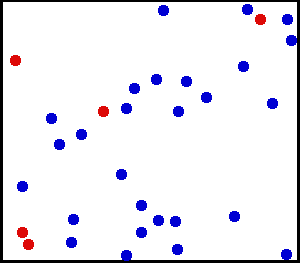Kinetic theory of gases


Kinetic theory of gases is a fundamental theory in physics that explains the behavior of gases by considering them as composed of many small particles (atoms or molecules) moving in random directions with various speeds. This theory provides a molecular-level understanding of temperature, pressure, and volume of gases, as well as the relationships between these properties.
Overview[edit]
The kinetic theory of gases is based on several key assumptions:
- Gases consist of a large number of particles that are in constant, random motion.
- The volume of the gas particles is negligible compared to the total volume in which the gas is contained.
- Gas particles are assumed to interact only through elastic collisions, meaning there is no loss of kinetic energy in the collisions.
- There are no forces of attraction or repulsion between the gas particles.
- The average kinetic energy of the gas particles is directly proportional to the gas temperature in kelvins.
These assumptions allow for the derivation of the Ideal Gas Law, which states that the pressure (P) of a gas is directly proportional to the temperature (T) and the number of moles (n) of the gas, and inversely proportional to the volume (V) of the gas, or PV = nRT, where R is the ideal gas constant.
Historical Development[edit]
The kinetic theory of gases was developed in the 19th century by scientists such as James Clerk Maxwell, Ludwig Boltzmann, and Rudolf Clausius. Their work laid the foundation for statistical mechanics, a branch of physics that uses probability theory to study the behavior of systems composed of a large number of particles.
Applications[edit]
The kinetic theory of gases has numerous applications in both theoretical and applied physics. It is used to explain and predict the properties of gases, such as:
- Diffusion: the process by which molecules spread from areas of high concentration to areas of low concentration.
- Thermal conductivity: the ability of a substance to conduct heat.
- Viscosity: the measure of a fluid's resistance to flow.
- Effusion: the process by which gas particles pass through a tiny opening from one container to another.
Limitations[edit]
While the kinetic theory of gases provides a good approximation for many gases under a wide range of conditions, it has its limitations. It does not accurately predict the behavior of gases at very high pressures or very low temperatures, where the assumptions of the theory break down. In these cases, real gas behavior deviates from the ideal gas law, and more complex models, such as the Van der Waals equation, are needed to describe the gas properties accurately.
Conclusion[edit]
The kinetic theory of gases is a cornerstone of classical physics that has significantly advanced our understanding of the natural world. By providing a molecular-level explanation for the macroscopic properties of gases, it has enabled scientists and engineers to predict and manipulate the behavior of gases in a variety of scientific and industrial applications.
Ad. Transform your life with W8MD's Budget GLP-1 injections from $75


W8MD offers a medical weight loss program to lose weight in Philadelphia. Our physician-supervised medical weight loss provides:
- Weight loss injections in NYC (generic and brand names):
- Zepbound / Mounjaro, Wegovy / Ozempic, Saxenda
- Most insurances accepted or discounted self-pay rates. We will obtain insurance prior authorizations if needed.
- Generic GLP1 weight loss injections from $75 for the starting dose.
- Also offer prescription weight loss medications including Phentermine, Qsymia, Diethylpropion, Contrave etc.
NYC weight loss doctor appointmentsNYC weight loss doctor appointments
Start your NYC weight loss journey today at our NYC medical weight loss and Philadelphia medical weight loss clinics.
- Call 718-946-5500 to lose weight in NYC or for medical weight loss in Philadelphia 215-676-2334.
- Tags:NYC medical weight loss, Philadelphia lose weight Zepbound NYC, Budget GLP1 weight loss injections, Wegovy Philadelphia, Wegovy NYC, Philadelphia medical weight loss, Brookly weight loss and Wegovy NYC
|
WikiMD's Wellness Encyclopedia |
| Let Food Be Thy Medicine Medicine Thy Food - Hippocrates |
Medical Disclaimer: WikiMD is not a substitute for professional medical advice. The information on WikiMD is provided as an information resource only, may be incorrect, outdated or misleading, and is not to be used or relied on for any diagnostic or treatment purposes. Please consult your health care provider before making any healthcare decisions or for guidance about a specific medical condition. WikiMD expressly disclaims responsibility, and shall have no liability, for any damages, loss, injury, or liability whatsoever suffered as a result of your reliance on the information contained in this site. By visiting this site you agree to the foregoing terms and conditions, which may from time to time be changed or supplemented by WikiMD. If you do not agree to the foregoing terms and conditions, you should not enter or use this site. See full disclaimer.
Credits:Most images are courtesy of Wikimedia commons, and templates, categories Wikipedia, licensed under CC BY SA or similar.
Translate this page: - East Asian
中文,
日本,
한국어,
South Asian
हिन्दी,
தமிழ்,
తెలుగు,
Urdu,
ಕನ್ನಡ,
Southeast Asian
Indonesian,
Vietnamese,
Thai,
မြန်မာဘာသာ,
বাংলা
European
español,
Deutsch,
français,
Greek,
português do Brasil,
polski,
română,
русский,
Nederlands,
norsk,
svenska,
suomi,
Italian
Middle Eastern & African
عربى,
Turkish,
Persian,
Hebrew,
Afrikaans,
isiZulu,
Kiswahili,
Other
Bulgarian,
Hungarian,
Czech,
Swedish,
മലയാളം,
मराठी,
ਪੰਜਾਬੀ,
ગુજરાતી,
Portuguese,
Ukrainian
